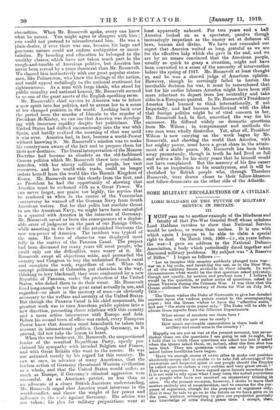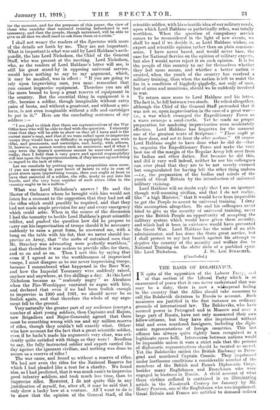SOME MILITARY RECOLLECTIONS OF A CIVILIAN.
LORD HALDANE ON THE FUTURE OF MILITARY SERVICE IN BRITAIN.
T MUST pass on to another example of the blindness and fatuity, of that Pre-War General Staff whose opinions Lord Haldane invokes to show that National Service would be useless, or worse than useless. It is one with which again I happen to be able to claim a special right to deal. On March 18th, 1908—i.e., eix years before the war—I gave an address to the National Defence Association, a body which periodically dined together and discussed military problems. My subject was "A Reserve of Rifles." I began as follows :— " Let us imagine this country suddenly plunged into war— war on a big scale, and involving the use, as in the Boer War, of all the military forces available in those islands. In such circumstances what would be the first question asked privately, though not openly, by serious and prudent men? I believe It would be the question, or rather series of questions, asked by Queen Victoria during the Crimean War, It WWI thus that the Queen addressed the Seoretary of State for War on July 3rd, 1854—
' The Queen wishes the Duke of Newcastle to give her detailed answers upon the various points stated in the aocompanying paper ; but the Queen wishes to have the "effective state," and not "the state upon paper only." The Duke will be able to obtain these reports from the different Departments.
What stores of muskets are there hem ?
When will the new ones be toady ?
How much serviceable ammunition is there both of artillery and small arms in the country 7' Happily we are not at war at the present moment, but never- theless these are the questions I am going to ask to-night, for I hold that in truth these questions are asked too late if asked when the Queen asked them, or, indeed, after the first shot has been fired. They are questions which eau only be properly asked before hostilities have begun.
Have we enough stores of extra rifles to make our position absolutely secure and to enable us to take full advantage of the patriotism and Imperial spirit of our people should the Empire be called upon to endure a very sudden and very great strain I' That is my question. I have argued upon former occasions that it is not safe to rely upon what I may term the naked patriotism of a people who have not received an elementary training in arms. On the present occasion, however' I desire to leave that matter entirely out of consideration, and to assume for the pur- poses of argument, though for the purposes of argument only, that it may be safe to go onto the future as we have gone on Uk the past, without attempting to give our population generally any knowledge of arms during peace time. I accept, then,
for the moment, and for the purposes of this paper, the view of those who oonsider that national training beforehand is not necessary, and that the people, though untrained, will be able to give us all that we shall need to ask from them at a crisis."
I shall not weary the readers of the Spectator with more of the details set forth by me. They are not important. What is important is what was said by Lord Haldane's arch- pundit, the late Lord Nicholson, the Chief of the General Staff, who was present at the meeting. Lord Nicholson, who, as the readers of Lord Haldane's letter will see, is still his great stand-by in opposing universal service, would have nothing to say to my argument, which, it may be recalled, was in effect : "If you are going to rely upon improvising men, you musb remember that you cannot improvise equipment. Therefore you are all the more bound to keep a great reserve of equipment in the country. But the essential thing in equipment is a rifle, because a soldier, though imaginable without extra pairs of boots, and without a greatcoat, and without a uni- form, is not even imaginable without a rifle and cartridges to put in it." Here are the concluding sentences of my address :—
" I am glad to think that there are representatives of the War Office here who will be ablo to deal with the question. I sincerely trust that they will be able to show us that all I have said is the merest mare's-nest, and that if we were called upon to improvise troops they would have no diffloulty in equipping the men with rifles, and greatcoats, and cartridges, mid, lastly, with officers. If, however, we cannot receive such an assurance, and if what I may term the Queen's questions oannot be answered satisfac- torily, then I hold that a very grave and special responsibility will rest upon the Improvisationaliste, if they are not up and doing in regard to the lack of rifles.
Let me conclude by putting my main proposition once more. If you are meaning in your heart of hearts to rely in case of greet stress upon improvising troops, then you ought at least to have that essential of a soldier, the rifle, ready to put into his hands, and the very least number of such extra rifles in the country ought to be a million."
What was Lord Nicholson's answer ? He and the Master of Ordnance whom he brought with him would not listen for a moment to the suggestion that they had not all the rifles which could possibly be required, and that they had not made ample provision for any and every emergency which could arise. When in the course of the discussion I had the temerity to heckle Lord Haldane's great scientific soldier, and pushed the question how did he propose to carry out his improvisation of troops should it be necessary suddenly to raise a great force, he answered me, with a bang on the table with his fist, that we never should im- provise an Army, that "the mobs of untrained men that Mr. Strachey was advocating were perfectly worthless," and that therefore it was useless to provide rifles for them, and so on and so on. Then I met this by saying that even if I agreed as to the worthlessness of improvised troops, I must disagree as to our never improvising troops, because I remembered what happened in the Boer War, and how the Imperial Yeomanry were suddenly raised, anyhow and anywhere, at five shillings a day. At this Lord Nicholson became as "zealously angry" as Abraham when the Fire-Worshipper ventured to argue with him, and declared that even if we had been foolish enough to improvise in 1900 and 1901, we should never be so foolish again, and that therefore the whole of my argu- ment fell to the ground.
Very naturally the greater part of my audience (except a number of alert young soldiers, then Captains and Majors, now Brigadiers and Major-Generals) agreed that there must be something wrong with ins and my million reserve of rifles, though they couldn't tell exactly what. Other- wise how account for the fact that a great scientific soldier, even if he hadn't made his arguments very clear, was evi- dently quite satisfied with things as they were ? -Needless to say, the fully instructed soldier and expert carried the day against the ignorant civilian, and nothing was done to secure us a reserve of rifles I The war came, and found us without a reserve of rifles. We had not even the rifles for the National Reserve for which I had pleaded like a tout for a charity. We found also, as I had predicted, that it was much easier to improvise goal infantry soldiers, and took much less time, than to improvise rifles. However, I do not quote this in any justification of myself, for, after all, it may be said that I only drew a lucky bow at a venture. All I want to do is to show that the opinion of the General Staff, of the
scientific soldier, with his scientific idea of our military needs, upon which Lord Haldane so pathetically relies, was totally worthless. When the question of compulsory service comes to be reconsidered in the light of new events, We shall be mad if we decide it, as Lord Haldane wishes, on expert and scientific opinion rather than on plain common- sense. I have never based, and would never base, the case for National Service on the opinion of military experts, but also I would never reject it on such opinion. It is for the people of this country to say for themselves whether they feel more secure, and whether a better nation is created, when the youth of the country has received a military training, than when the nation is left to resist the foe in a condition of higgledy-piggledy, not only of men, but of arms and munitions, should we be suddenly involved in war.
To return once more to Lord Haldane and his letter. The fact is, he fell between two stools. He relied altogether, although the Chief of the General Staff pretended that it was not so, upon improvisation in the case of a great war- i.e., a war which swamped the Expeditionary Force as a wave swamps a sand-castle. Yet he made no proper preparation for rendering improvisation even moderately effective. Lord Haldane has forgotten for the moment one of the greatest texts of Scripture : " These ought ye to have done, and not to irate the other undone." Of course Lord Haldane ought to have done what he did do—that is, organize the Expeditionary Force and make the very best use of the margin of the Regular Army left over from its Indian and other duties. But because he did this, and did it very well indeed, neither he nor his colleagues can ever plead that they are to be not merely excused but congratulated for having left the other thing undone —i.e., the preparation of the bodies and minds of the youth of Great Britain by the introduction of universal military training. Lord Haldane will no doubt reply that I am an ignorant though well-meaning civilian, and that I do not realize, like "a high Minister," that it would have been impossible to get the People to assent to universal training. I deny this assumption altogether. He and his colleagues never tried to give us the security of universal training, never gave the British People an opportunity of accepting the military system which would have given them security, and which had it been in existence would have prevented the Great War. Lord Haldane has the mind of an able administrator, and has done the State great service, but I shall protest to my last breath against his attempt to deprive the country of the security and welfare due to National Training on the other dicta of a purblind cynic
(Concluded.)



































 Previous page
Previous page